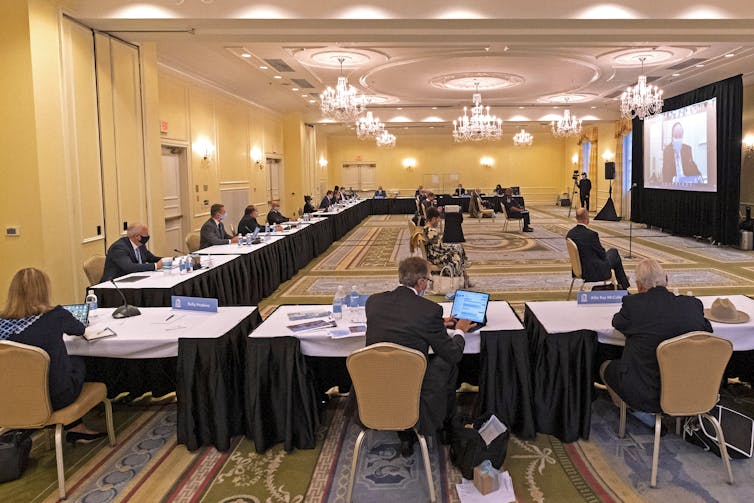Trustees' handling of Nikole Hannah-Jones' tenure application shows how university boards often fail
University trustees are among the least-studied groups in higher education. Increasingly, they're making news – as the focus of a crisis. That raises the question: To whom are they accountable?

University boards of trustees hold considerable power over the institutions they govern, but get attention only when they’re hiring a new president or if there is a crisis.
Yet, increasingly boards aren’t navigating or mediating crises – they are creating them. On June 30, after deliberating in a closed session, the University of North Carolina-Chapel Hill Board of Trustees voted 9-4 to grant journalist, MacArthur Fellowship recipient and Pulitzer Prize winner Nikole Hannah-Jones tenure. But that decision came only after a firestorm of public criticism after Hannah-Jones was initially not granted tenure during earlier deliberations by the board.
Hannah-Jones’ case had been supported at every level of the tenure process at UNC-Chapel Hill – including the provost, who serves as the chief academic officer, and the president – except for the Board of Trustees. That was an oddity. While the system’s statutes delegate personnel decisions about faculty to the board, it is common for the board to support faculty and administration’s tenure recommendations at the institution level.
In this case, the board initially avoided a final vote on Hannah-Jones’ case and questioned the validity of her work and ability. Similar concerns were not brought up in previous evaluations of candidates for the same position. Initial concerns of the board echoed talking points spread via conservative broadcast media.
In emails obtained by North Carolina journalism outlet, The Assembly, it also appears board members were in communication with a major donor who disagreed with Hannah-Jones’ approach to journalism. If true, that would undermine principles of academic freedom and shared governance among faculty, administration and the board – central aspects of tenure evaluation. If donors can influence personnel decisions, this undermining is exacerbated.
We are higher education governance scholars who investigate issues of board composition, organizational culture and decision-making.
The Hannah-Jones case and other, similar episodes demonstrate how board composition and board culture can affect how boards make decisions, inserting seemingly political interests and personal values into an arena that is supposed to be free of them. This ideal of objective, or at the very least democratically representative, decision-making is important to ensuring that the best interests of the institution remain the primary motivation for decisions made.

Boards and equity
Governing boards hold a fiduciary duty to the institution or system they serve. Their role is to support and protect the institutional mission, make sure the institution is effectively executing the mission and ensure the institution can continue to execute its mission. Boards often focus on fundraising, external relations, accountability and oversight.
When functioning well, boards make decisions driven by the institution’s best interests – not their own or those of their friends, allies or associates.
Although that is the expectation, it is not always the practice in decisions ranging from budget allocation to policy setting and presidential hires. The controversial and highly politicized hiring of Lt. Gen. Robert Caslen as University of South Carolina president in 2019 highlighted these concerns and how political connections and motivations can cause board practices to go off course. Caslen has since resigned, after admitting to plagiarism.
There’s not much diversity on public universities’ boards. Currently, according to an industry survey, most of their members are older white men from the business sector.
Yet, as higher education becomes increasingly concerned with diversity, we have observed that the issue of board diversity seems to be left off the table.
This lack of diversity matters, because even when aiming for objectivity, research has suggested that board members often find their personal or political values more than intertwined with the decision-making process. Their values are figuratively making the decisions.
State politics’ influence
Public institution boards are mostly appointed by a governor or state legislators.
This can mean that sometimes it is not simply personal or individual political values driving the decisions about everything from academic program approval to presidential hires. Researchers have found that state political climates and ideologies can influence what decisions are made by boards.
One example of this problem is when a board selects a president with strong political alliances but with little or no higher education experience. These decisions can be more troubling if they are made without input from faculty and other institutional stakeholders, who customarily weigh in on these important choices.
One study noted that trustees sometimes go beyond their formal roles, getting involved in university operations through donations and support to specific areas. They build or broker connections, creating external partnerships that may or may not benefit the institution.
Governing boards led by partisan appointees can make higher education institutions arenas for political contests, such as the closing of research and academic centers that produce research or hold missions in opposition to a board’s dominant political ideology. These contests in turn take the boards’ focus away from serving students and other members of the university community.
Is there accountability?
It is sometimes suggested by higher education experts and commonly understood by the university community that boards should be independent and autonomous entities, unconcerned with the day-to-day and operational issues of diversity and equity. That allows them to provide institutional accountability and oversight.
As scholars who study higher education boards, we believe that politicized board composition can reinforce the vestiges of patriarchy and white supremacy, among other forms of hegemony, within today’s institutions.
Some scholars have also expressed alarm at the increasingly political nature of board decision-making, in the form of denials of tenure or presidential turnover.

The University of North Carolina-Chapel Hill situation, as noted by The Foundation for Individual Rights in Education, a non-partisan group that defends free speech on campuses, removed the veil of autonomy and independence under which boards have traditionally operated. It has raised concern that governing boards could be motivated by loyalty to political parties and ideologies.
Up until now, boards have mostly been invisible players in higher education’s conversation about diversity, equity and inclusion.
But boards’ invisibility is eroding. That exposure raises two issues: If board members are accountable to the political figures who appoint them, can they still be representative of the institution they govern? Can they contribute to the growing drive for greater diversity, equity and inclusion on campuses?
Navigating the challenges
We believe boards can become more accountable and equity-focused by developing and implementing practices that allow them to navigate ever-changing social and political landscapes.
We recently developed a framework to guide boards in carrying out their duties called “Culturally Sustaining Governance.” We show how board decision-making can intentionally prioritize equity, as state political realities and cultural wars continue to exert pressure.
Frameworks like ours aid boards in being more accountable, while at the same time ensuring the protection of an institution’s viability and reputation. Our framework urges boards to consider the questions of equity as foundational to deliberation and decision-making as opposed to being an afterthought.
Board members operate at the highest levels of university administration. They can make decisions that truly center diversity and equity, while carrying out their responsibilities with excellence and diligence. That, in the end, leads to stronger, more equitable institutions that benefit everyone into the future.
[The Conversation’s Politics + Society editors pick need-to-know stories. Sign up for Politics Weekly.]
The authors do not work for, consult, own shares in or receive funding from any company or organization that would benefit from this article, and have disclosed no relevant affiliations beyond their academic appointment.
Read These Next
Iran-US nuclear talks may fail due to both nations’ red lines – but that doesn’t make them futile
The US administration may sense that Iran is weak and ready to do a deal. But negotiations could be…
Coffee crops are dying from a fungus with species-jumping genes – researchers are ‘resurrecting’ the
Coffee wilt disease has continually devastated farms around the world. Understanding the fungus’s…
In World War II’s dog-eat-dog struggle for resources, a Greenland mine launched a new world order
Strategic resources have been central to the American-led global system for decades, as a historian…




